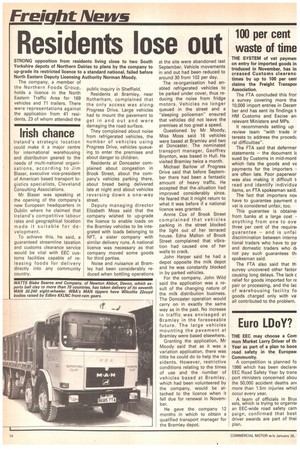rResidents lose out
Page 16

If you've noticed an error in this article please click here to report it so we can fix it.
STRONG opposition from residents living close to two South Yorkshire depots of Northern Dairies to plans by the company to up-grade its restricted licence to a standard national, failed before North Eastern Deputy Licensing Authority Norman Moody.
The company, a member of the Northern Foods Group, holds a licence in the North Eastern Traffic Area for 169 vehicles and 71 trailers. There were representations against the application from 41 residents, 23 of whom attended the
public inquiry in Sheffield.
Residents at Bramley, near Rotherham, complained that the only access was along' Progress Drive. Large vehicles had to mount the pavement to get in and out and were damaging the road surface.
They complained about noise from refrigerated vehicles, the number of vehicles using Progress Drive, vehicles queueing to enter the premises and about danger to children.
Residents at Doncaster complained about congestion in Brook Street, about the company's vehicles parking there, about bread being delivered late at night and about vehicles reversing down a one-way street.
Deputy managing director Elizabeth Moss said that the company wished to up-grade the licence to enable loads on the Bramley vehicles to be integrated with loads belonging to NFT, a sister company with similar delivery runs. A national licence was necessary as that company moved some goods for third parties.
Noise and nuisance at Bramley had been considerably reduced when bottling operations at the site were abandoned last September. Vehicle movements in and out had been reduced to around 30 from 102 per day.
The re-organisation had enabled refrigerated vehicles to be parked under cover, thus reducing the noise from fridge motors. Vehicles no longer queued in the street and a "sleeping policeman" ensured that vehicles did not leave the premises at too great a speed.
Questioned by Mr Moody, Miss Moss said 16 vehicles were based at Bramley and two at Doncaster. The nominated transport manager, Geoffrey Boynton, was based in Hull. He visited Bramley twice a month.
Michael Barlow of Progress Drive said that before September there had been a fantastic amount of heavy traffic. He accepted that the situation had improved considerably since. He feared that it might return to what it was before if a national licence was granted.
Annie Cox of Brook Street complained that vehicles parking in the street blocked the light out of her terraced house. Edna Melton of Brook Street complained that vibration had caused one of her walls to crack.
John Harper said he had a depot opposite the milk depot and he was constantly blocked in by parked vehicles.
For the company, John Wild said the application was a result of the changing nature of the milk distribution business. The Doncaster operation would carry on in exactly the same way as in the past. No increase in traffic was envisaged at Bramley in the foreseeable future. The large vehicles mounting the pavement at Bramley were based elsewhere.
Granting the application, Mr Moody said that as it was a variation application, there was little he could do to help the residents. However, restrictive conditions relating to the times of use and the number of vehicles based at Bramley, which had been volunteered by the company, would be attached to the licence when it fell due for renewal in November.
He gave the company 12 months in which to obtain a qualified transport manager for the Bramley depot.








































































































